- Administrator
- Albums and Singles
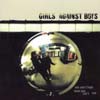 Thank God for Girls Against Boys. Yet another band that started on an indie, moved to a major, and now, back to an indie. Another band who once compromised for the big time, now compromises for no one. Another band that is reborn on their new album, throwing more energy out on tape now than they ever have. The only unfortunate label ever assigned to the band was that of "sex rock." Sure, their music is sexy. Sure, it's raw. And it's definitely not for the faint of heart. But it's not "sex rock." And "You Can't Fight What You Can't See" is arguably the most punishing record with which any of the band's members have been involved.Jade Tree
Thank God for Girls Against Boys. Yet another band that started on an indie, moved to a major, and now, back to an indie. Another band who once compromised for the big time, now compromises for no one. Another band that is reborn on their new album, throwing more energy out on tape now than they ever have. The only unfortunate label ever assigned to the band was that of "sex rock." Sure, their music is sexy. Sure, it's raw. And it's definitely not for the faint of heart. But it's not "sex rock." And "You Can't Fight What You Can't See" is arguably the most punishing record with which any of the band's members have been involved.Jade Tree
GVSB is back, and they're taking no prisoners. The album was recorded in Mission Sound in Brooklyn, but mixed in the band's own studio, a makeshift one in an old warehouse. Reportedly it was cold there, and the record bears the effect. This music, too, is cold, calculated, and horribly melodic. GVSB have been taken as abrasive in the past, with a lot of noise in the mix meant to push the listener away. This is their first record with audible hooks - and that's not a slam. It's more user-friendly, but in the best way possible. I dare say anyone can find something to like in the music on this record. Where the music suffers slightly is in the lyrics. As the liner notes clearly display, these three to four-and-a-half minute songs are lyrically sparse. This means that key phrases are repeated over and over, often to the point where you almost feel like you're being programmed. You're not. That's always been a major tenet of GVSB's music. It's just more noticeable because the music has improved so drastically. It's only irksome on '300 Looks for the Summer': "I don't like Hollywood" is said way too much. But it's a complete, energetic, and likeable album. I like this album more than anything GVSB's members have ever done. I hope they can better it. And I hope they start with the lyrics, because the music has reached its plateau.
 
samples:
 
 
Read More
- Administrator
- Albums and Singles
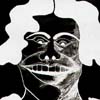 You'd be hard pushed to realise that samples from classical music formthe core of the second Illuminati EP, as they've mostly been utterlydistorted and pulverised beyond recognition. A middle aged electriciancommented that this reminded him of Soft Machine which is odd becauseDave Clarkson of Illuminati and Planetsounds is a big fan of theirs,but I'd never have thought it was something that sounded similar. WhenI mentioned the comparison to Dave he asked if it was the third track,"Glass Box Trap" which chucks a melodic keyboard jitter over thrummingdouble drone backbone, and a nasal voice muttering disgruntled andnebulous. If I was going to fling comparisons at Illuminati though I'dhave to mention Throbbing Gristle, particularly "DOA," but I think Idid that with the first EP. This one has the same picture on the cover,but inverted to negative and in some ways this a darker and moremenacing trip. A deep singular pulse beat opens the strange door onto amicroscope resolution for "Midget Germs" which vibrate ominously inhell spawned misery. Feedback screams and muffled moans punctuate thistortured cancerous eyeball injection. The poor germs don't stand achance when "Argenteum Atavism" squirts beatnoise bleach all over them.Crunching along in hectic overloaded abandon, this is what it mightsound like if Aphex Twin tried to put one over on Non. Just as themelody creeps in one final crash collapses into semi-ambient bleepscapegurgling. The fourth and final track swings "The Strange Door" shut anddesperate knocking can be heard from outside as the germs shut outsideslowly fizzle to their demise, and a new dawn of lush angelic keyboardbursts across the blackened sky. Distant thunder rumbles.
You'd be hard pushed to realise that samples from classical music formthe core of the second Illuminati EP, as they've mostly been utterlydistorted and pulverised beyond recognition. A middle aged electriciancommented that this reminded him of Soft Machine which is odd becauseDave Clarkson of Illuminati and Planetsounds is a big fan of theirs,but I'd never have thought it was something that sounded similar. WhenI mentioned the comparison to Dave he asked if it was the third track,"Glass Box Trap" which chucks a melodic keyboard jitter over thrummingdouble drone backbone, and a nasal voice muttering disgruntled andnebulous. If I was going to fling comparisons at Illuminati though I'dhave to mention Throbbing Gristle, particularly "DOA," but I think Idid that with the first EP. This one has the same picture on the cover,but inverted to negative and in some ways this a darker and moremenacing trip. A deep singular pulse beat opens the strange door onto amicroscope resolution for "Midget Germs" which vibrate ominously inhell spawned misery. Feedback screams and muffled moans punctuate thistortured cancerous eyeball injection. The poor germs don't stand achance when "Argenteum Atavism" squirts beatnoise bleach all over them.Crunching along in hectic overloaded abandon, this is what it mightsound like if Aphex Twin tried to put one over on Non. Just as themelody creeps in one final crash collapses into semi-ambient bleepscapegurgling. The fourth and final track swings "The Strange Door" shut anddesperate knocking can be heard from outside as the germs shut outsideslowly fizzle to their demise, and a new dawn of lush angelic keyboardbursts across the blackened sky. Distant thunder rumbles.
samples:
Read More
- Administrator
- Albums and Singles
 For everyone out there who fell in love with the brutal industrialrhythms of Speedy J's 'A Shocking Hobby,' be prepared for somethingvery different. 'Loudboxer,' Jochem Paap's latest CD on the alwaysenjoyable Novamute label, returns to his earlier days of Plus 8 styledminimal techno bangers and away from the noise that undoubtedly madethe Ant-Zen family tremble. However, the darkness of 'A Shocking Hobby'is still intact here, and the first mind-bludgeoning single "Krekc"makes that very apparent. Devoid of any clear melody, the album existsas an upward slope, increasing in intensity so that by the time tracknine ("Sevntrak") arrives, I'm reminded why my hard techno-obsessedco-workers can't get enough of this shit. Juxtapose this: machineschugging away with an assembly line fury while sweat drenched clubbersdance helplessly enslaved to the merciless beats. (Sound corny? Wellthen don't let the door hit you in the ass on the way out.) This is theessence of industrial, a style that has splintered beyond recognitionbut yet has found its way home somehow here. Presented as a continuousmix with a few carefully placed interludes ("Cement", "Inter Zil"),'Loudboxer' fails to displease those who like their music hard, fast,and strictly 4/4 for the dancefloor. Speedy J once again rivals alllike-minded peers in the genre.
For everyone out there who fell in love with the brutal industrialrhythms of Speedy J's 'A Shocking Hobby,' be prepared for somethingvery different. 'Loudboxer,' Jochem Paap's latest CD on the alwaysenjoyable Novamute label, returns to his earlier days of Plus 8 styledminimal techno bangers and away from the noise that undoubtedly madethe Ant-Zen family tremble. However, the darkness of 'A Shocking Hobby'is still intact here, and the first mind-bludgeoning single "Krekc"makes that very apparent. Devoid of any clear melody, the album existsas an upward slope, increasing in intensity so that by the time tracknine ("Sevntrak") arrives, I'm reminded why my hard techno-obsessedco-workers can't get enough of this shit. Juxtapose this: machineschugging away with an assembly line fury while sweat drenched clubbersdance helplessly enslaved to the merciless beats. (Sound corny? Wellthen don't let the door hit you in the ass on the way out.) This is theessence of industrial, a style that has splintered beyond recognitionbut yet has found its way home somehow here. Presented as a continuousmix with a few carefully placed interludes ("Cement", "Inter Zil"),'Loudboxer' fails to displease those who like their music hard, fast,and strictly 4/4 for the dancefloor. Speedy J once again rivals alllike-minded peers in the genre.
samples:
Read More
- Administrator
- Albums and Singles
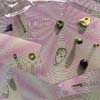 What can you say about 76 year old composer Francis Dhomont? You couldsay he's been given lots of prizes for his noises. You could say hetalks a good acousmatic game theory. You could say he wears an eyepatchover his right eye. He first grabbed my attention with his"Frankenstein Symphony" on Asphodel, a plunderphonic acousmatic journeyon which he skillfully cut up and stitched together various excerptsfrom works by his French Canadian contemporaries. He now tips his hatto perhaps his biggest inspiration. This sound cycle is a fiftiethanniversary homage to musique concrète pioneer Pierre Schaefer,specifically the first movement of his "Étude Aux Objets," from whichDhomont has sourced his raw materials. There are many furtivesimilarities to the Schaefer original, but Dhomont stretches thejourney out almost twice as long and eschews Schaefer's violent tapesplice edits, focusing and magnifying curiously questioning speakerpanning whirls into successive new smoothed out seascapes. In theopening funeral march, "Objets Retrouvés," the sounds seem to be askingthemselves what they are, curious to find themselves hanging aroundtheir own echoes. Dhomont breathes new life into them and gives themcelebratory purpose. The second cycle "AvartArsSon" paints in the skyfrom a more varied and clattering palette. Sounds loom into theforeground, shimmer and mutate. Latterly choral vox limbo over gluggingmystery spools. Bells ring out across the city full of gleeful honkingtaxis, soon washed away by tidal waves. This is the most cinematic ofthe four cycles, in that more untransmuted sound sources are apparentthan in relatively abstracted sequences elsewhere. The third cycle"Novars" was the first to be completed and is the hub around which theothers rotate, but since it is sequenced after "Objets Retrouvés"despite being completed seven years earlier, it seems like an extendedversion thereof. "Phonurgie" hones and magnifies elements from theprevious cycles casting long late summer evening shadows and deep poolreflections, folding mystery into myth. Latterly it seems as if severalglass instrument orchestras are playing cut up fragments in reverse asthey sink into the sea. A little recurring chuckle is a mirthfulreminder of how much fun listening can be.
What can you say about 76 year old composer Francis Dhomont? You couldsay he's been given lots of prizes for his noises. You could say hetalks a good acousmatic game theory. You could say he wears an eyepatchover his right eye. He first grabbed my attention with his"Frankenstein Symphony" on Asphodel, a plunderphonic acousmatic journeyon which he skillfully cut up and stitched together various excerptsfrom works by his French Canadian contemporaries. He now tips his hatto perhaps his biggest inspiration. This sound cycle is a fiftiethanniversary homage to musique concrète pioneer Pierre Schaefer,specifically the first movement of his "Étude Aux Objets," from whichDhomont has sourced his raw materials. There are many furtivesimilarities to the Schaefer original, but Dhomont stretches thejourney out almost twice as long and eschews Schaefer's violent tapesplice edits, focusing and magnifying curiously questioning speakerpanning whirls into successive new smoothed out seascapes. In theopening funeral march, "Objets Retrouvés," the sounds seem to be askingthemselves what they are, curious to find themselves hanging aroundtheir own echoes. Dhomont breathes new life into them and gives themcelebratory purpose. The second cycle "AvartArsSon" paints in the skyfrom a more varied and clattering palette. Sounds loom into theforeground, shimmer and mutate. Latterly choral vox limbo over gluggingmystery spools. Bells ring out across the city full of gleeful honkingtaxis, soon washed away by tidal waves. This is the most cinematic ofthe four cycles, in that more untransmuted sound sources are apparentthan in relatively abstracted sequences elsewhere. The third cycle"Novars" was the first to be completed and is the hub around which theothers rotate, but since it is sequenced after "Objets Retrouvés"despite being completed seven years earlier, it seems like an extendedversion thereof. "Phonurgie" hones and magnifies elements from theprevious cycles casting long late summer evening shadows and deep poolreflections, folding mystery into myth. Latterly it seems as if severalglass instrument orchestras are playing cut up fragments in reverse asthey sink into the sea. A little recurring chuckle is a mirthfulreminder of how much fun listening can be.
samples:
Read More
- Administrator
- Albums and Singles
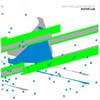 Berlin's WMF Club is home for Saturday night Komfort.Labor events suchas Native Instruments' Native Labs. The company is maker of modularsound software Reaktor and I'm assuming that the 14 artists found hereused it for these exclusive tracks. Some of electronica's elite are ofcourse to be found here amongst the line-up: Kid 606, Jake Mandell,Richard Devine, Errorsmith, F.X. Randomiz, Rob Acid, Solar X, Kent,Vladislav Delay, Siegmar Kreie, Mike Dred, Nitrada vs. Vger, Vert andLazyfish. If anything, the resulting hour of audio proves that Reaktoris a really flexible environment for electronic music makers.Everything from looping soundscapes to inexplicable experiments tothrobbing techno is represented, though there's an especially strongemphasis on chaos and/or rhythm throughout. Of the lot, I'd say onlyErrorsmith's annoying metallic beat thing is worthy of skipping and Kid606's bland "Damn Dre Why You Always Hating On Me" doesn't live up toits cool title. The following three are my favorites: Mandell's"Broccoli Crisis" is a seriously storming dance number that would makethe most timid clubber get their ass out on the floor and move; F.X.Randomiz's "Danuni" melodically churns a granular mass of bits andbobs; snd Vladislav Delay performs his usual magic trick for "The SuperHas Left The Model" by skillfully turning microscopic digitalia insideout, almost at random. The interactive ROM portion might just be themost interesting aspect of the disc, that is, if I ever figure it out.A Reaktor-like application lets you graphically manipulate the "what","when" and "how" of Lazyfish's "Mewark-Stoderaft" on the fly. Fun, forawhile.
Berlin's WMF Club is home for Saturday night Komfort.Labor events suchas Native Instruments' Native Labs. The company is maker of modularsound software Reaktor and I'm assuming that the 14 artists found hereused it for these exclusive tracks. Some of electronica's elite are ofcourse to be found here amongst the line-up: Kid 606, Jake Mandell,Richard Devine, Errorsmith, F.X. Randomiz, Rob Acid, Solar X, Kent,Vladislav Delay, Siegmar Kreie, Mike Dred, Nitrada vs. Vger, Vert andLazyfish. If anything, the resulting hour of audio proves that Reaktoris a really flexible environment for electronic music makers.Everything from looping soundscapes to inexplicable experiments tothrobbing techno is represented, though there's an especially strongemphasis on chaos and/or rhythm throughout. Of the lot, I'd say onlyErrorsmith's annoying metallic beat thing is worthy of skipping and Kid606's bland "Damn Dre Why You Always Hating On Me" doesn't live up toits cool title. The following three are my favorites: Mandell's"Broccoli Crisis" is a seriously storming dance number that would makethe most timid clubber get their ass out on the floor and move; F.X.Randomiz's "Danuni" melodically churns a granular mass of bits andbobs; snd Vladislav Delay performs his usual magic trick for "The SuperHas Left The Model" by skillfully turning microscopic digitalia insideout, almost at random. The interactive ROM portion might just be themost interesting aspect of the disc, that is, if I ever figure it out.A Reaktor-like application lets you graphically manipulate the "what","when" and "how" of Lazyfish's "Mewark-Stoderaft" on the fly. Fun, forawhile.
samples:
Read More
- Abe Forman-Greenwald
- Albums and Singles
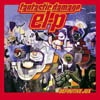 "Fantastic Damage" is a perfect description for this album of denselylayered beats that serve as a soundtrack for El-P's tour through adystopian urbanscape. Almost every beat on the album is so rich andevocative it seems a shame that El-P has to bark over almost every oneof them. Some of his lyrical concepts work well, as on the track"Stepfather Factory" where he effectively constructs and deconstructs acompany that churns out indistinguishable, abusive father figures. Thisis one of the few tracks where he takes his vocals down to aconversational level and it works really well. On too much of the albumthough, his vocals come off as monotonous yelling which undermines thepower of his intelligent lyrics. El-P has an uncommon problem for anMC—so much he needs to say that he is unable to fit all of his lyricsinto his allotted lines of verse. This problem of too many words to goaround is particularly noticeable on the verses of "Truancy". When heslows the rhymes down during the chorus, each lyric becomes more potentand fits well into the rhythm. He also uses an interesting approach atthe beginning of "Dead Disnee" where he adjusts his cadence and rhymescheme to mimic that of the early De La Soul single "Plug Tunin'".While paying respect to an earlier, more creative era of hip-hop, healso demonstrates how a varied rhyme style can compliment a song.Unfortunately, the rest of the song falls into his same abrasivelymonotonous pattern. Most of the album's lyrical content falls into the"conscious lyrics" category—which makes some of the slips into standardhip-hop homophobia all the more frustrating.
"Fantastic Damage" is a perfect description for this album of denselylayered beats that serve as a soundtrack for El-P's tour through adystopian urbanscape. Almost every beat on the album is so rich andevocative it seems a shame that El-P has to bark over almost every oneof them. Some of his lyrical concepts work well, as on the track"Stepfather Factory" where he effectively constructs and deconstructs acompany that churns out indistinguishable, abusive father figures. Thisis one of the few tracks where he takes his vocals down to aconversational level and it works really well. On too much of the albumthough, his vocals come off as monotonous yelling which undermines thepower of his intelligent lyrics. El-P has an uncommon problem for anMC—so much he needs to say that he is unable to fit all of his lyricsinto his allotted lines of verse. This problem of too many words to goaround is particularly noticeable on the verses of "Truancy". When heslows the rhymes down during the chorus, each lyric becomes more potentand fits well into the rhythm. He also uses an interesting approach atthe beginning of "Dead Disnee" where he adjusts his cadence and rhymescheme to mimic that of the early De La Soul single "Plug Tunin'".While paying respect to an earlier, more creative era of hip-hop, healso demonstrates how a varied rhyme style can compliment a song.Unfortunately, the rest of the song falls into his same abrasivelymonotonous pattern. Most of the album's lyrical content falls into the"conscious lyrics" category—which makes some of the slips into standardhip-hop homophobia all the more frustrating. But all M.C. criticism aside, the beats are consistently varied and noloop is repeated long enough to wear out its welcome. El-P shows hisstrongest talent lies in production by introducing many experimentalsounds and effects rarely added to the hip-hop mix. He uses lots ofdistorted synths and electric guitar samples and mixes them overprogrammed, organic sounding drums to head-nodding affect. My favoritemoments in the album all occur when he turns off the vocals for astretch and lets his instrumentals shine. DJ Abilities compliments thelayered beats successfully by adding texture without showing off hisspeed. His best contribution is in the middle of "Delorian" where heuses his scratches as one of the instruments in the band rather than asa solo spotlight.
I will certainly be looking out for a future version of "FantasticDamage" instrumentals because the beats are innovative and I would liketo hear how each one sounds on its own. If you can get through 70minutes worth of severe vocals, the album does go out on one of itsstrongest notes with the grandly cinematic final track, "Blood". And besure to listen for that tight instrumental at the end that kicks intohigh gear after the vocals have faded away.
samples:
Read More
- Administrator
- Albums and Singles
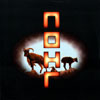
Published as a limited CD-R to be sold at their recent European appearances, Coil's latest EP is a beautiful and stunning piece of work. It consists of a nearly 20 minute instrumental piece in two versions—a "prepared" improvisation with their current tour lineup: Michael York on breton pipes, Cliff Stapleton on hurdy gurdy and a subtle, percussive groove underlayed by various electronic devices of Mr's. Balance, Christopherson and Norris. The main feeling this recording conjures up for me is one of an un-experienced nostalgia—like an unsure longing for life during an ancient time.
Danny Hyde returns to Coil's mixing desk to collaborate on "Remote Viewing 3" and the interlude, "Remote Viewing 2," which seems to be constructed mainly out of parts of the original recording session with added and altered sounds and vocal snippets. "2" works perfectly as a bridge between the two lengthy parts when listened in one go, but doesn't stand out as a strong piece when singled out. Coil have easily managed to surpass any expectations and leave me anticipating the next 'proper' release. It would be a loss, however, if the music on this release wasn't reissued in another form for more to hear.
samples:
 
Read More
- Administrator
- Albums and Singles
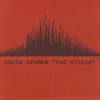 Chris Brokaw should be familiar as guitarist from Come and Pullman and drummer for the New Year, Codeine and Consonant, not to mention all the other groups and collectives he's been playing out with recently - check out www.chrisbrokaw.com for the lowdown. And if his name isn't familiar then you have got some serious record buying to do! 'Red Cities' is his first solo album following a split single with Spanish band Viva Las Vegas.
Chris Brokaw should be familiar as guitarist from Come and Pullman and drummer for the New Year, Codeine and Consonant, not to mention all the other groups and collectives he's been playing out with recently - check out www.chrisbrokaw.com for the lowdown. And if his name isn't familiar then you have got some serious record buying to do! 'Red Cities' is his first solo album following a split single with Spanish band Viva Las Vegas.
Chris played everything (guitar and percussion) on these atmospheric instrumentals. There's a western-noir feel to most of it and the most effective tracks build in emotional intensity just like Come, every note heavy with mysterious longing and deep enough to flip your stomach over. After a short intro, the longest track "The Fields (Part II)" takes a trip deep into the city night where events are unfolding outside the upstairs window, each note delivering ever more irreversible immanence. Chris really knows how to pack a sledge full of raw emotion into every note, and this is a stunningly dense dark cinematic ride. Only lighter track is the more playful "Topsfield State Fair," which perhaps skirts closer to Pullman campfire folkiness than the deeper Come shadows the rest of the album so satisfyingly evokes. I'm not sure if the title of the album was in any way inspired by the W.S. Burroughs classic 'Cities of the Red Night' but if anyone was ever ambitious enough to try to make a film of that book, this would make a perfect soundtrack.
 
samples:
 
Read More
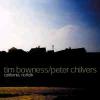 Deviating from their usual medium of on-demand CD-Rs, the Burning Shedonline label debuts their first Red Book disc in a good old fashionedjewel case. Peter Chilvers (Alias Grace) and Tim Bowness (No-Man,Centrozoon) also collaborate in Samuel Smiles and Henry Fool.'California, Norfolk' is a sort of extension of the former's 'World OfBright Futures' album, the title track in particular. Bowness'ruminations on lost love and fading memories are fairly simple, but hisrich tone and breathy delivery brings the inherent sadness and mutedjoys within them to life. The vocals are very forward in the mix butdeftly framed by minor beats, sampled auras and tender piano, keyboard,guitar and bass melodies and textures. It's beautifully stark - partballadry, part ambient, part soundscape - think of Nick Drake's 'PinkMoon' spirit as processed by Brian Eno. It's strange how quickly thisalbum floats by despite its 45 minute running time. And although goodbeginning to end and back again, "Hostage" and "Winter With You" are mypersonal favorites. For the former, sweeping orchestral synth andbackground giggling help tell the short story of "the girl you neverforgot, was never happy with her lot ... walked around a hostage to herfright". And in the latter, the crunch of trodden snow drifts in andout of its 10 plus minutes. Chilvers subtlety steals the limelight bybreaking up an instrumental passage with a delicate piano refrain.'California, Norfolk' is another great addition to the ever growingChilvers and Bowness related pile.
Deviating from their usual medium of on-demand CD-Rs, the Burning Shedonline label debuts their first Red Book disc in a good old fashionedjewel case. Peter Chilvers (Alias Grace) and Tim Bowness (No-Man,Centrozoon) also collaborate in Samuel Smiles and Henry Fool.'California, Norfolk' is a sort of extension of the former's 'World OfBright Futures' album, the title track in particular. Bowness'ruminations on lost love and fading memories are fairly simple, but hisrich tone and breathy delivery brings the inherent sadness and mutedjoys within them to life. The vocals are very forward in the mix butdeftly framed by minor beats, sampled auras and tender piano, keyboard,guitar and bass melodies and textures. It's beautifully stark - partballadry, part ambient, part soundscape - think of Nick Drake's 'PinkMoon' spirit as processed by Brian Eno. It's strange how quickly thisalbum floats by despite its 45 minute running time. And although goodbeginning to end and back again, "Hostage" and "Winter With You" are mypersonal favorites. For the former, sweeping orchestral synth andbackground giggling help tell the short story of "the girl you neverforgot, was never happy with her lot ... walked around a hostage to herfright". And in the latter, the crunch of trodden snow drifts in andout of its 10 plus minutes. Chilvers subtlety steals the limelight bybreaking up an instrumental passage with a delicate piano refrain.'California, Norfolk' is another great addition to the ever growingChilvers and Bowness related pile.
samples:
- Administrator
- Albums and Singles
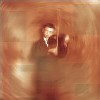 Oh, how far the Lambchop has come. This Nashville-based band, oncebelieved to be another alt-country creation, has created a fine summeralbum for you to listen to on those hot days when you just want to siton your porch and sip some lemonade. Except that it really doesn'tbelong in that setting. The country is further away from their soundnow than it's ever been. "Is a Woman" is actually a fine neo-loungetype album, where singer and main songwriter Kurt Wagner has embracedthe piano as the main instrument. His voice hasn't changed, still likea higher pitched Leonard Cohen blended with Belle and Sebastian'sStuart Murdoch. This is lazy music, where you can listen without anyreal commitment or strain. Even the song titles evoke summer -"Caterpillar," "Bugs," "The Old Matchbook Trick," and "The New CobwebSummer," for example - and the lyrics tell tales of old friends, dogs,and the mischief of youth. Lambchop is born anew in this sound, asthere's more energy in this release, more groove, more feeling, andmore beauty than they've ever produced. Pretty amazing considering thatthe majority of songs are over the five-minute mark and of a slowertemp. Wagner's lyrics conjure fantastic images - "Once I had afriend/who had the knack of tossing/his mind around geography/boy youthink you have problems?/The hunter is asleep/at least that's what Icall him" on "The New Cobweb of Summer" - and the instumentation isplayful with gently strummed guitar, faded organ, and flashes of hornshere and there joining the piano. The only complaint is that it's not a"whole listen" record. I cannot, after listening to it once, listen toit straight through again. It causes the sound to be near montonous, aseach song has a similar structure. Perhaps that's actually a backhandedcompliment, however. It's a complete work, and if you allow it to, itwill suck you in. Lambchop sound like this is finally fun for them, andthe listener is encouraged to join the festivities. What are youwaiting for? Let's go catch some lightning bugs...
Oh, how far the Lambchop has come. This Nashville-based band, oncebelieved to be another alt-country creation, has created a fine summeralbum for you to listen to on those hot days when you just want to siton your porch and sip some lemonade. Except that it really doesn'tbelong in that setting. The country is further away from their soundnow than it's ever been. "Is a Woman" is actually a fine neo-loungetype album, where singer and main songwriter Kurt Wagner has embracedthe piano as the main instrument. His voice hasn't changed, still likea higher pitched Leonard Cohen blended with Belle and Sebastian'sStuart Murdoch. This is lazy music, where you can listen without anyreal commitment or strain. Even the song titles evoke summer -"Caterpillar," "Bugs," "The Old Matchbook Trick," and "The New CobwebSummer," for example - and the lyrics tell tales of old friends, dogs,and the mischief of youth. Lambchop is born anew in this sound, asthere's more energy in this release, more groove, more feeling, andmore beauty than they've ever produced. Pretty amazing considering thatthe majority of songs are over the five-minute mark and of a slowertemp. Wagner's lyrics conjure fantastic images - "Once I had afriend/who had the knack of tossing/his mind around geography/boy youthink you have problems?/The hunter is asleep/at least that's what Icall him" on "The New Cobweb of Summer" - and the instumentation isplayful with gently strummed guitar, faded organ, and flashes of hornshere and there joining the piano. The only complaint is that it's not a"whole listen" record. I cannot, after listening to it once, listen toit straight through again. It causes the sound to be near montonous, aseach song has a similar structure. Perhaps that's actually a backhandedcompliment, however. It's a complete work, and if you allow it to, itwill suck you in. Lambchop sound like this is finally fun for them, andthe listener is encouraged to join the festivities. What are youwaiting for? Let's go catch some lightning bugs...
samples:
Read More
- Administrator
- Albums and Singles
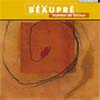 Yves Beupré beavers away in his workshop building a hundred harpsichords. As he hammers and strings and flexes the things he records the sounds of the instruments' birth pangs. Lucky for our ears, he stitches the recordings into acousmatic soundscapes that are mysterious, evocative and plain beautiful.
Yves Beupré beavers away in his workshop building a hundred harpsichords. As he hammers and strings and flexes the things he records the sounds of the instruments' birth pangs. Lucky for our ears, he stitches the recordings into acousmatic soundscapes that are mysterious, evocative and plain beautiful.
Any clot who thinks electroacoustic music has become irredeemably entrenched in the same old gestures and routines should open their ears to this stunning debut from a composer possessed of genius who is going to have a (sur)real challenge surpassing such a masterpiece. This is a richly transporting transparent journey into the guts of the creation process. Images pour from the darkened room into the minds eye of wood and varnish and nails and strings swirling about in a void and accreting magically into a heavenly harpsichord which looms ever larger as I shrink to dust mote size. Boxed inside the vintage contraption, rhythmic structures unfold and coalesce and drone visions of eighteenth century time locks emerge. Historic and modern worlds collide in the computer as small planks become dense forests. And all this without the aid of hallucinogens!
 
samples:
 
Read More